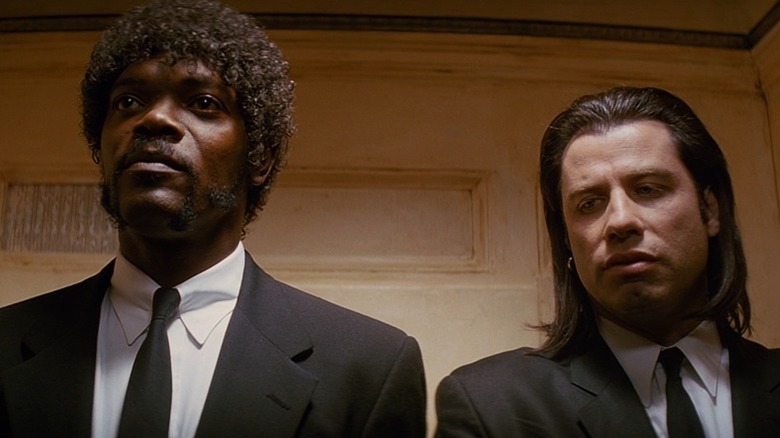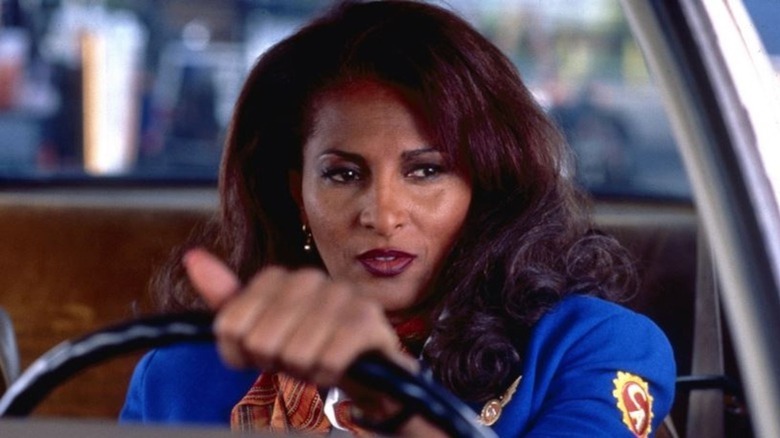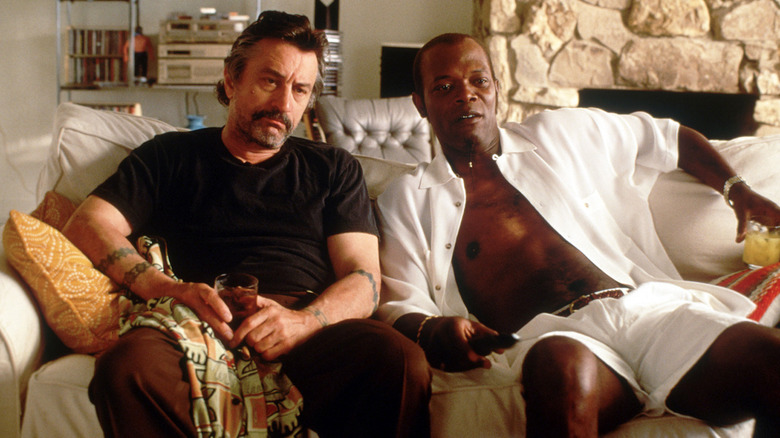Quentin Tarantino Never Felt The 'Pressure' To Follow Up Pulp Fiction's Success
Quentin Tarantino is a confident man. He blew in out of nowhere to both scandalize and titillate the 1992 Sundance Film Festival with his brutally hilarious heist film "Reservoir Dogs." Journalists quickly discovered he possessed a hellacious gift for gab. At any given moment, he might tear down his award-winning elders or champion critically maligned exploitation flicks. By the fall of 1993, college dorm rooms were adorned with "Reservoir Dogs" posters bearing quotes from the film. Bitter cinephiles accused him of being a talentless grifter who ripped off Hong Kong action classics that hadn't received U.S. distribution. Expectations for his next film were impossibly high. People either wanted to see him justify the hype or fall flat on his caricaturesque of a face.
Even those in the former camp couldn't have anticipated the profane magnificence of "Pulp Fiction." A triptych of crime stories seamlessly blended together in a nonlinear fashion directly connected with Generation X's media-obsessed wavelength. Dense with witty pop-culture references and deep-pull music cues, it altered the Hollywood landscape in a way no movie had since Dennis Hopper's "Easy Rider." It became the first independent film to clear $100 million at the U.S. box office, and inspired countless imitators.
Over the course of two years, Tarantino had rocketed from unknown video store clerk to filmmaking god. He became a fixture on the late-night talk show circuit, and made cameo appearances in not-so-good indies like "Sleep with Me" and "Destiny Turns on the Radio." In film terms, it felt like he was living the first half of "Rocky III." He seemed primed for a downfall. For an artist so steeped in film history, you'd think he might've fretted that his critical comeuppance was on the horizon. Tarantino, however, wasn't sweating one damn bit.
The downside to making a masterpiece
On paper, "Jackie Brown" looked like the safest of bets. Tarantino's chatty killers had been compared many times over to the loquacious criminals of Elmore Leonard's novels. Barry Levinson's peppy adaptation of Leonard's "Get Shorty" felt like QT Lite. Perhaps Tarantino could get under the skin of the author's "Rum Punch" characters and deliver pure, uncut Leonard.
That it took Tarantino three years to get "Jackie Brown" off the ground raised more than a few eyebrows. Had he squandered his gifts on high-profile (and highly lucrative) script doctoring for Jerry Bruckheimer (most notably on "Crimson Tide" and "The Rock")? Was he too enamored of his own voice? Had he descended into self-parody?
There were red flags everywhere, but in a 1997 interview with Empire, Tarantino was adamant that he felt not an iota of pressure to top "Pulp Fiction" (while also foreshadowing a future project):
"People assume that I wasn't following it up immediately because I was intimidated or scared by it – there's something really insulting about that to me. I've tried to build a career that's been completely based on no fear, and I truly don't fear anything artistic. I fear a guy in an alley with a baseball bat, I fear the Manson family bursting into my house, I fear a rabid dog walking down the street, but I don't fear anything artistic."
Tarantino always controls his own destiny
If this sounds awfully immodest, well, that's Tarantino, but he went on to clarify that his confidence had everything to do with determining his own fate via the screenplay. As a writer-director, he's never had to scour the script market for his next project. Per Tarantino, "If I was David Fincher and I'd just directed 'Se7en,' I would imagine I'd be reading a zillion scripts, trying to find what I wanted to do next, and I'd probably find nothing worthy of doing. Apparently Scorsese had that after 'Taxi Driver.”"
Tarantino trusts in his creative instincts, and he's rarely been led astray ("Grindhouse" is, thus far, his sole commercial failure, but he bounced right back from that with "Inglourious Basterds"). Even in his late 50s, he was capable of capturing the zeitgeist with the unexpectedly touching alternate history of the California '60s with "Once Upon a Time in Hollywood." He doesn't dwell on missteps, and, if we take him at his word, doesn't engage in self-doubt. He presses forward, and pours himself into every movie. He might be a cocky son-of-a-gun, but you can't argue with the results.


